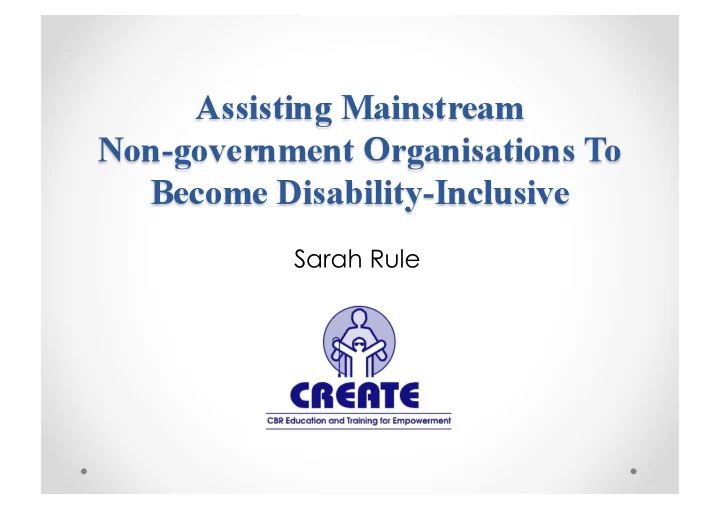

Sarah Rule
Article 32 of the UN Convention on the Rights of Persons with Disabilities: o State Parties will take appropriate & effective measures through international cooperation to support the CRPD, including “Ensuring that international cooperation, including international development programmes, is inclusive of and accessible to persons with disabilities”
• South Africa has ratified the CRPD therefore there are obligations to respect the rights of persons with disabilities • Disability activists on the boards or are trustees of certain donor organisations in the country
• CBR Education and Training for Empowerment • Our mission: o CREATE strives to promote Community Based Rehabilitation and disability rights in southern Africa and to train people in rehabilitation and disability issues in a way that empowers them and their communities
• Our goal: o To be a sustainable, independent, reflective, rights-based organisation that makes a difference in the lives of people with disabilities through supporting individuals and promoting an inclusive society.
• Approached by Oxfam Australia to assist mainstream NGOs in water, sanitation & hygiene projects to become disability- inclusive • Approached by FirstRand Foundation to assist NGOs working on gender-based violence issues to become disability-inclusive
• Based on Index for Inclusion (Booth and Ainscow, 2002) • Adapted from the context of inclusive schools to inclusive organisations / NGOs
Inclusive policies Inclusive Inclusive culture practices Disability Inclusion
• Is the organisation welcoming to all? For example: • Are the offices accessible to all people? • Do the staff know the appropriate terminology to use when referring and also talking to people with disabilities? • Is information accessible to all?
• Do the policies of the organisation support inclusion and help to make disability inclusion sustainable? For example: • Is there a strategy to remove barriers to the appointment of staff with disabilities? • Is there any organisational policy concerning allocation of resources for inclusion?
• Are the activities and projects of the organisation fully disability inclusive? For example: • Can staff communicate effectively with all beneficiaries including those who have an intellectual impairment and those who are deaf? • Are local people with disabilities involved in the planning, implementation & evaluation of activities?
• Work with the NGO from where they are at • Interventions specific to each NGO • CREATE needs to learn about each NGO’s context, area of work and organisational culture • Don’t assume the degree of understanding and knowledge about disability in each organisation
• Baseline study • Disability awareness training with staff • Adaptations to the toilet on the property to make it wheelchair accessible • Paying for an architect to design a waterless, accessible public toilet
• Baseline study • Disability awareness for staff • LGBTI awareness for CREATE • Facilitating sign language training to promote inclusion • Participation in disability & policy workshop
• The move towards disability-inclusion may be donor-driven, not a need identified by the NGO • Important to build capacity in local DPOs to support mainstream NGOs to become disability inclusive • Building capacity of mainstream NGOs to become inclusive takes time & resources
• Disability inclusion reaches into areas not often dealt with by disability-specific organisations. • Mainstream NGOs have expertise in their field of operation which disability NGOs can learn • The more mainstream NGOs that include persons with disabilities, the closer we get to a fully inclusive society
Forward to a fully disability-inclusive society!
Recommend
More recommend